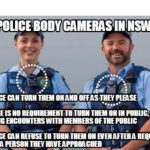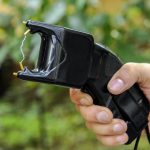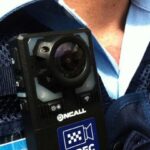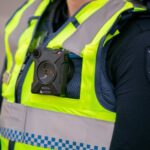The Rules Regarding NSW Police Use of Body Worn Cameras
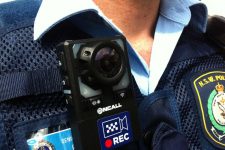
Steven Pampalian was shot dead by officers of the New South Wales Police Force following a confrontation in Sydney’s lower north shore on Thursday, 25 May 2023.
According to reports, emergency services were called to Alexander Street, North Willoughby at around 11.30am after receiving reports the 41-year old – who family and friends describe as a ‘sweet soul’ – was acting erratically and threatening residents.
Police say that when they arrived at the scene, Mr Pampalian ran at them with two large knives before officers discharged their firearms, shooting him dead.
The officers were reported to have been wearing body cameras at the time, which are standard issue and there to ensure transparency and accountability when it comes to encounters with members of the public, but say the devices were switched off.
This has led the deceased’s family to question why none of the attending officers turned their cameras on, given they knew they were about to confront a man they were told was acting in a violent manner.
The following outlines the rules when it comes to the use of police body worn cameras.
What are body worn cameras?
The wearing of body worn cameras has been standard for frontline New South Wales police officers since 2014.
As the name suggests, the devices are recording cameras that are embedded into an officer’s uniform.
The cameras used by police in our state provide high definition video and high quality audio recordings of police activities.
All recordings are stored on a secure video management system with restricted access.
Body worn camera recordings can be used:
- As evidence for various proceedings, including defended hearings and jury trials;
- For investigative purposes including complaints against police; and
- As training material for police.
Rules Regarding Use of Body Worn Cameras
The NSW Police Body-Worn Video Camera Standard Operating Procedure, provides many of the operational rules regarding the use of body worn cameras.
The procedure notes that body worn cameras should be used by frontline police:
- When police would normally use their official police notebook to record information;
- To capture evidence or record something of relevance;
- When exercising a police power or performing a policing function;
- During first response crime and incident investigation;
- When inspecting licensed premises;
- In any policing incidents involving antisocial behaviour
- During vehicle stops;
- During conversations with members of the public which may relate to an incident, is relevant to an investigation, potential criminal proceedings, or contains possibly valuable information;
- In situations where the use of force is anticipated, except search warrant entries; and
- When conducting searches (including strip searches).
A person’s consent to record is not required for a body worn camera to be used.
However, it is good practice for police to inform people that they are being recorded.
The procedure notes that there are some circumstances in which police should not record, including:
- Recording entire rostered shifts, except where justified in the specific circumstances.
- Recording material that is not related to the lawful execution of police duties.
- Covertly recording material.
- Recording within 25 metres of a suspect device or flammable material.
- Recording for work surveillance purposes.
- When the filming does not comply with LEPRA (e.g. if a male police officer was to record a female suspect during a strip search).
- In connection with the execution of a search warrant prior to or during forced entry.
- A courtroom or court precinct unless responding to an incident.
Police may also cease recording if they believe there are compelling reasons for doing so.
These reasons should be placed on the video record prior to the recording being stopped or recorded in an official police notebook.
Police Can Turn Cameras On and Off As They Please
There is some evidence that the use of body worn cameras may reduce the police use of excessive force and even make members of the public feel safer in their interactions with police.
However, there are concerns that body worn cameras can be used to manipulate recordings, with police strategically “forgetting” to turn on body worn cameras for self-serving purposes or facing in certain directions to avoid recording incidents of misconduct.
Of even greater concerns are incidents whereby police have discharged weapons before deleting the footage taken, as well as actively switched off their cameras before fatally shooting members of the public.
Despite such disturbing conduct, the New South Wales government has refused to pass laws regulating when and how body cameras must be used, or what can be done with the recorded footage, including when it has to be handed-over to the persons recorded in interactions.
This is a very different situation to many jurisdictions in the United States, which have strict rules regarding such matters.
Accountability
Dr Darren Palmer from Deakin University has argued that body worn cameras may mean citizens are less likely to formally complain against police, in fear that they will be undermined or dismissed by selective body worn camera footage.
However, that argument is open to debate, as those who believe they were treated unfairly may do the opposite.
Section 167A of the Police Act 1990 (NSW) makes it an offence to make a false complaint about the conduct of a police officer, when knowing that complaint to be false.
The offence carries a maximum penalty of 12 months imprisonment.
The Rules Regarding NSW Police Use of Body Worn Cameras (395 words)
2023 Statements Re: Responsible Officers
In 2023, the New South Wales police force insinuated that responsible officers should have ‘nothing to worry about’ if they act appropriately according to the scope of their job. The Law Enforcement Conduct Commission Chief Commissioner Johnson stated that the government shouldn’t expand the scope of police powers but should focus more on the enforcement of body-worn cameras — especially in the more senior and veteran officers.
Johnson stated that there were ‘incidents involving it which call for that to occur’, hinting that there had been concerns in the police force with actions that were not necessary policing. Police who act appropriately should have nothing to worry about with body-worn cameras, especially since they can help prevent the overuse of lethal weapons, such as tasers or guns.
But, the use of body-worn cameras is still up to the discretion of the attending officer — something that could call into question an officer’s judgement in a high-pressure situation or their leniency towards rules. Unfortunately, Johnson noticed that his officers were slow to change, leading to an increase in critical incidents, lack of preparation in dealing with mental health crises, and over-policing of Aboriginal youths.
NSW Coroner Highlights Lack of Regulations
The death of Todd McKenzie highlighted how the NSW Police Force should mandate their officers to wear body-worn cameras in all instances, not just up to a person’s discretion. With the previous statements in 2023 from Johnson highlighting how officers are slow to change, it was only a matter of time before a critical incident escalated — and that is exactly what happened with the death of McKenzie.
NSW is one of only two states in Australia that does not require officers to wear body-worn cameras in high-risk incidents – times when people may argue that body-worn cameras are the most necessary. Deputy state coroner Graham highlighted that ‘mandating body-worn video for tactical police far outweighs any difficulties that may be caused’ by the implementation.
Despite previous incidents, like the 2022 death of a 17-month-old, there had been ‘no real movement’ in the NSW force. The public would think that the necessary and highly preventable death of an infant would lead to a strict change in the body-video regulations, but that wasn’t the case. Instead, the force just tried to cover up the lack of mental health training.

